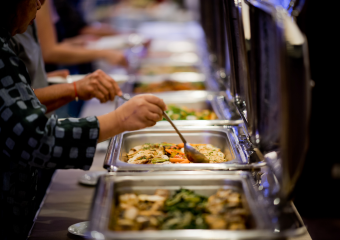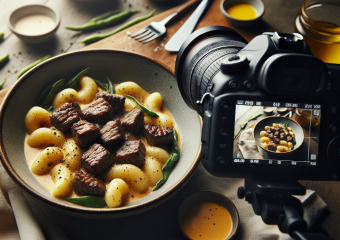Do virtual kitchens offer more online ordering options? It depends – CBC.ca
Scrolling through a food delivery app in Regina can feel like doomscrolling through a social media feed.
As of last week, UberEats had 206 businesses listed that would deliver food to the CBC Saskatchewan office in Regina.

But do all of these restaurants really exist? Some vendors on the food delivery app include business names that don’t have an independent physical location, meaning it’s possible for a customer to order food out of the same kitchen that creates food for a differently named restaurant.
For example, at least seven distinct Regina retailers on UberEats and SkipTheDishes — Dessert Club, Chicken Hut, Smash Hamburgur, Subs and Wraps Shop, The Burger Grill, YQR Burgers and Broken Egg — list the same address as that of Western Pizza at 2125 11th Ave.

There are no signs at the location to suggest these seven restaurants run out of the same place. Western Pizza did not respond to multiple interview requests.
These restaurants, also known as virtual kitchens, are concerning to some people in the food business, but embraced by others.
‘False sense of choice’
Jorashanko Mondal, an international student at Saskatchewan Polytechnic College, said he’s aware of the concept of virtual kitchens, but doesn’t agree with it. He said that getting food from the same kitchen can defeat the purpose when he wants to try out new local restaurants.

“It’s like a monopoly is going on and they want to hide the monopoly, which is kind of disingenuous. They also want to brand as different, but also want to give the same product, which is really saddening because it kind of betrays the customer,” he said.


Jaco Van Heerden is the founder and CEO of a Regina-based food delivery startup called Chow Local. He said some virtual kitchens aren’t fair to the customers because they could end up ordering from a familiar restaurant while thinking they were trying something different.
“From a consumer standpoint or the person that’s ordering food, I think it’s also problematic because you get a false sense of choice,” he said.
He said the number of online eateries increased during the COVID-19 pandemic and he’s starting to see the effects.
The concept of “ghost kitchens,” a term sometimes used interchangeably with virtual kitchens, also accelerated during the pandemic. Like virtual kitchens, ghost kitchens offer online ordering, but the difference is they do not have a storefront or eat-in dining.
Heerden said Chow Local works differently than food delivery apps such as UberEats, SkipTheDishes and DoorDash. Chow Local doesn’t take a commission on every food order, but charges a monthly fee to restaurants to be on the app, which Heerden said reduces the number of virtual kitchens.

He said on other apps, larger chains can crowd out smaller local restaurants that don’t have the resources to run multiple menus.
“If you’re running a traditional restaurant, and you’re on one of these food delivery apps, you’re now competing against another restaurant that has 10 different restaurants that are showing up in the search results,” he said.
Heerdan said he also actively screens restaurants that have multiple business names and removes them from his app, if they do show up.
‘Go for it’
One business that runs virtual kitchens is Prairie Donair. The company started in Regina and now has multiple locations in Saskatchewan, Manitoba, Alberta and Ontario.
Joshua Bagchi, founder and CEO of Prairie Donair, said the concept can be advantageous for bigger chains that can potentially invest in offering multiple menus out of the same kitchen.
“I personally say that those types of operators [not exploring virtual kitchens] are just being lazy. You know, get off your butt and come up with the concept and, and go for it,” he said.

Bagchi said having virtual kitchens helps the business diversify its offerings while spending relatively less on capital costs like rent and utilities — essentially using the existing infrastructure to create a new business.
“In some of our situations, it’s saved the franchisees from going under,” he said. “It literally saved their business. It saved their personal livelihood. It made doing business a little bit more beneficial for them than it was doing before. It added another entire revenue stream,” he said.
Concept can be exploited, business owners say
Both Heerdan and Bagchi agree that virtual kitchens give options to restaurant owners, but Heerdan said it becomes a problem when owners start exploiting them.
“I think in reality, what ends up happening is people realize that these kitchens offer them an opportunity to get found in these food delivery apps and they’ll take it sort of to the maximum and open all these restaurants,” Heerdan said.
Bagchi agreed, saying the problem is with chains that are copying and pasting menus, and only creating a duplicate identity to “pollute” the apps. He said that’s why he has a diversified menu across his restaurant and his virtual kitchens, offering donairs, pizzas and perogies.
“Those guys, you know what? That’s a joke. We fight about it at the head office all the time. We go after DoorDash, SkipTheDishes and Uber. We tell these guys, ‘Hey, what are you doing?’ These guys don’t have anything proper to have that virtual concept,” Bagchi said.
East Coast Restaurants Group opened in Moncton during the pandemic with 12 restaurants in a single kitchen. Now, it has grown to 18.
UberEats has a section on how to create a virtual kitchen on its website, but says it must have at least five unique menu items. In an emailed response to questions about virtual kitchens, UberEats said it introduced new guidelines to help restaurants.
“We’ve also heard feedback from consumers that they want to see consistently high quality options and from restaurants that they want to make sure they have a fair shot in the marketplace,” the email said.
SkipTheDishes did not respond to an interview request from CBC. Doordash responded, but its response did not address concerns associated with virtual kitchens.






